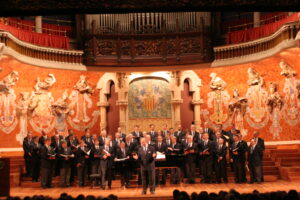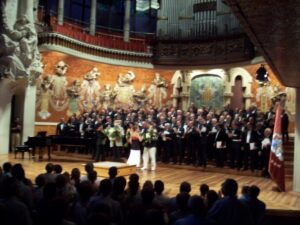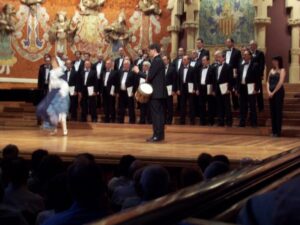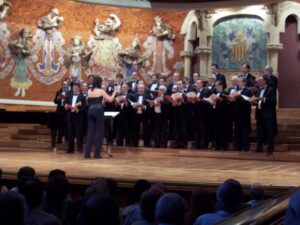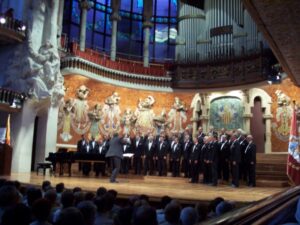First International Symposium for Men's Choirs - Barcelona 2005
Barcelona and the “autonomous community” of Catalonia of which it is capital is a hotbed of choral activity. A principal unifying organization is the Federació de Cors de Clavé (FCC), which coordinates the activities of 150 choirs (men’s, women’s, mixed, etc.) throughout Catalonia. The name Clavé, incidentally, is taken from Josep Anselm Clavé, the 19th-century founder of the first men’s choirs on the Iberian peninsula.
In recent years, the FCC has engaged in many projects to promote choral singing in Catalonia, and its most recent endeavor was the “First International Symposium for Men’s Choirs,” which took place July 9-23, 2005. Only 6 men’s choruses were invited to participate:
- Côr Meibion Colwyn from Wales
- The Slovak Teachers’ Choir (Spevácky Zbor Slovenskych U?itelov) from Slovakia
- The Coral Santa Lucía from the autonomous community of Spain known as Basque Country
- The Choral Society Saint Rafailo Banatsky from Serbia
- The Bonifantes Male Voice Choir from the Czech Republic
- Mastersingers USA
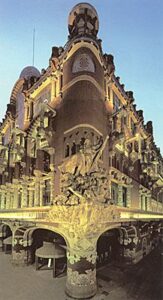
The first 3 choruses participated during the first week of the symposium; the latter 3, the second week. Each chorus 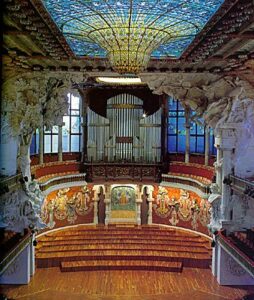 gave 4 concerts. Three of the concerts were at small venues, either in Barcelona or in its suburbs, in most cases sharing the stage with a local choir. The fourth concert was at the Palau de la Música Catalana, one of the great concert halls of the world, built in 1905-8 and designed in the modernist style by Lluís Domènech i Montaner.
gave 4 concerts. Three of the concerts were at small venues, either in Barcelona or in its suburbs, in most cases sharing the stage with a local choir. The fourth concert was at the Palau de la Música Catalana, one of the great concert halls of the world, built in 1905-8 and designed in the modernist style by Lluís Domènech i Montaner.
The choruses were billeted in the resort town of Malgrat de Mar some 60 km. northeast of Barcelona, along the part of the Mediterranean known as the Costa Brava. Meals, lodging, and ground transportation were provided gratis by the FCC, as was an “excursion day”.
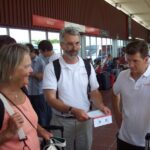 There were 58 singers who made up this version of Mastersingers USA, accompanied by 23 wives and significant others. They arrived from all parts of the U.S. (and one from Germany), and for the first time in Mastersingers’ European adventures, we all had separate travel arrangements, instead of traveling as a group. About half the group was scheduled to arrive at Malgrat de Mar on Friday or earlier; the remainder on Saturday (or later).
There were 58 singers who made up this version of Mastersingers USA, accompanied by 23 wives and significant others. They arrived from all parts of the U.S. (and one from Germany), and for the first time in Mastersingers’ European adventures, we all had separate travel arrangements, instead of traveling as a group. About half the group was scheduled to arrive at Malgrat de Mar on Friday or earlier; the remainder on Saturday (or later).
We had tried to get details of travel arrangements between the Barcelona airport and our hotel, but the best we could get was vague assurances that we would be met and that transportation would be provided for the hour-long journey. Our hosts were given our individual travel schedules, and for our part, we each knew that it was possible to travel from the airport to Malgrat de Mar by train.
As things worked out, one bus was provided for us on both Friday and Saturday mornings, but very few of us arrived early enough to take advantage of this transportation. Most of us emerged from the international arrivals gate full of anticipation, only to find no clue of what to do next — no bus, no contact person, no sign, nothing. The reality of the situation hit some of us quickly; for others, it took an hour or more of waiting, but we all eventually realized we were going to have to figure out the train connection (all except for a few who grit their teeth and spent the 100+ euros for a taxi).
It was a 20-minute train ride to the city, then a change to another line and another hour and 15 minutes to Malgrat de Mar. All of this wasn’t bad if you spoke a little Spanish, were clever enough to get a train schedule or were adept at figuring out train lines with a minimum of signs. Without those advantages and traveling at commute hours with all your luggage, the stress was unavoidable. That quickly dissipated though, as we greeted old friends and relaxed in the new surroundings.
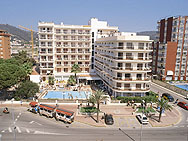 Our accommodations at the Hotel Reymar were spartan and amenities were few. The hotel’s dining room served 3 meals per day of which we could select 2 without charge. Food was served cafeteria style, including what seemed like local dishes, enhanced with some fresh fruit and vegetables. Still, the quality seemed to deteriorate as the week went on, and most of us sought out other restaurants, looking for a good cup of coffee and some relief from the sameness of the hotel fare.
Our accommodations at the Hotel Reymar were spartan and amenities were few. The hotel’s dining room served 3 meals per day of which we could select 2 without charge. Food was served cafeteria style, including what seemed like local dishes, enhanced with some fresh fruit and vegetables. Still, the quality seemed to deteriorate as the week went on, and most of us sought out other restaurants, looking for a good cup of coffee and some relief from the sameness of the hotel fare.
The Hotel Reymar was across the street from some of the better-class hotels, and the beach itself. Up and down the street on either side of us, hotels, restaurants, shops and other tourist amenities stretched for what seemed like miles. And except for a brief period in the early morning hours (3 a.m. to 8 a.m.), the wide sidewalks were crowded with tourists.
Many of the hotels featured live music every night of the week, and Hotel Reymar was no exception. The loud music played until midnight each night, dictating the bedtimes of those of us whose rooms faced the pool and the street. But very few of us ended our days at midnight. There were various nighttime activities to explore, bars and restaurants to check out, and long-standing friendships to rekindle — besides the new friendships to cultivate. Thirteen of us had never been on a Mastersingers overseas tour before, and another half-dozen or so had missed last year’s reunion in Chicago or the 2003 tour to the UK and Ireland.
How does a group like ours prepare for a trip like this and carry it off successfully? Of the 34 pieces in this trip’s repertoire, two-thirds had been sung by most of us on past tours or even back in our college days. We got the repertoire list in April, and many of us already had much of the music on hand. The new music arrived in late May, and we got recordings of most of the music on CDs in June. These were our resources to learn and memorize the music. Not surprisingly, only a few of us came close to having all the music memorized by the time we reached Barcelona. Still, experience and talent brought us quickly up to concert-readiness.
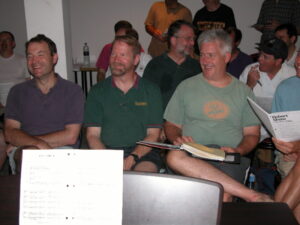 Our first rehearsal was on Saturday afternoon in the basement of the Hotel Reymar Playa, a short walk from our own hotel. A significant number of us were not present, still negotiating the trek from the airport to Malgrat de Mar. As always, we were warmed up by assistant conductor, Kerry Brennan. Kerry’s warm-ups are very thorough, starting with physical stretching, proceeding to vocal exercises (for range, tone, vowels, consonants), and ending with exercises for improving blend. We appreciated Kerry’s thoroughness so much that we applauded him on this first warm-up.
Our first rehearsal was on Saturday afternoon in the basement of the Hotel Reymar Playa, a short walk from our own hotel. A significant number of us were not present, still negotiating the trek from the airport to Malgrat de Mar. As always, we were warmed up by assistant conductor, Kerry Brennan. Kerry’s warm-ups are very thorough, starting with physical stretching, proceeding to vocal exercises (for range, tone, vowels, consonants), and ending with exercises for improving blend. We appreciated Kerry’s thoroughness so much that we applauded him on this first warm-up.
The rest of the rehearsal focused on the 13 pieces that we would be performing at the Palau de la Música Catalana on Sunday night. Singing, even rehearsing, with this chorus is a thrill for each of us. Many, perhaps most, are strong singers, and many are perceptive musicians, as well. But all are dedicated to the task at hand and bring an intensity that results in quick learning and alertness in performance. There is also a spirit rekindled from our college days, that comes through in our dynamic range from quiet and intense to a spine-tingling power that seems strong enough to fill any performance space.
But none of this would happen without the sensitive guidance, inspiration, and determined compulsion of our beloved director, Bruce McInnes. Bruce, whom we’ve honored in the past as “born to make men sing,” has a sensitivity to phrasing second to none. His sharp ear protects us against wrong notes and sagging pitch. And like the organist that he is, Bruce plays this group like a magnificent instrument, cueing each part, giving clear cut-offs, bringing out melodies, and encouraging each to sing with the heart and not just with the voice.
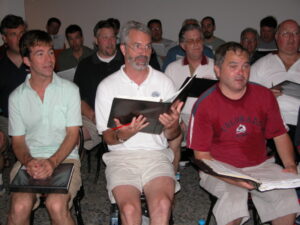 After this first rehearsal, which lasted just 2½ hours, we had a couple of hours to prepare for listening to a concert. The first 3 choruses, which had rehearsed and given 3 other performances each during the previous week, were to present a joint concert at the Palau this evening (our concert in the Palau, without the benefit of such extensive rehearsing would be tomorrow).
After this first rehearsal, which lasted just 2½ hours, we had a couple of hours to prepare for listening to a concert. The first 3 choruses, which had rehearsed and given 3 other performances each during the previous week, were to present a joint concert at the Palau this evening (our concert in the Palau, without the benefit of such extensive rehearsing would be tomorrow).
We were bussed to the heart of Barcelona where the 2000-seat Palau stood in glory of its colorful, ornate, modernist architecture. We entered with the rest of the concert-goers and took our seats in boxes on either side of the first balcony. Côr Meibion Colwyn from Wales performed first, singing 8 selections, nearly all by Welsh composers and nearly all in the Welsh language. The Slovak Teachers’ Choir was next, with 9 Slavic pieces that nonetheless incorporated a variety of styles. The Coral Santa Lucía then performed 6 selections that all seemed like Basque folk songs. The audience did not fill the hall, numbering perhaps about 1500, but they were appreciative throughout. We also noticed immediately that Barcelona audiences have the courtesy to cover with applause the complete entrance and exit of a performing group — no matter how slowly they move.
After the performance of the last group, the president of the Federació de Cors de Clavé presented each director with a gift (an engraved glass bowl) and made a short speech. Then all three choruses assembled on the stage to sing the joint piece, “Jovenivola.” This lovely music by Lluís Millet had been distributed to each group months before, together with a recording, to learn for this joint presentation. The problem was mastering the Catalan words, especially in the faster section. Language notwithstanding, the combined choruses sang the piece well, under the dynamic direction of a local music personality, whose name, unfortunately, was not in the program, and whom we only knew as “Ellie,” the sister of Olga, one of our guides from the FCC.
Through the evening we had been told by our hosts that there would be a “party” for all 6 choruses, those whose week was ending and those whose week was just beginning — and we were urged to attend. After returning to our hotel and getting some dinner, many of us were curious enough to check out the party, which was held in a “square,” or more correctly a widening in the road, about a kilometer toward the heart of Malgrat de Mar from our hotel. What we found was a stage, set up in the street with lights and blaring recorded music, to which a troupe of about 12 people performed a seemingly endless series of folk dances from a variety of Mediterranean cultural traditions. About 500 people were assembled to watch. Most of our group found this entertainment rather bland and left after a few minutes.
Rehearsal this morning focused on the music that we would be performing at the Palau this evening. Imagine facing a major concert with only 5 hours of rehearsal for a group that had not sung together for a year! Sure, all of the music had been sung by at least some of us before, but many of us were singing at least a few of the pieces for the first time, and there were a half-dozen or so who had never sung with our group at all.
Still, the rehearsal built our confidence, and after a free afternoon, we assembled in concert attire (blue blazers, charcoal grey slacks, red and green striped ties) for the bus trip to the Palau. Once there, we had 15 minutes to rehearse in the concert hall (watching the other groups rehearse before us). Then we rehearsed “Jovenivola,” running through it twice with “Ellie,” who had directed it so competently the night before. After a brief wait, we took seats in the boxes in the first balcony, and the show began.
The Choral Society Saint Rafailo Banatsky was the first to perform. Their repertoire consisted exclusively of Slavic liturgical music, beautifully done. One noteworthy aspect of their performance was a bass in their group, who produced some remarkable sounds: rumor had it that the note he was consistently hitting was a low A.
The Bonifantes Male Voice Choir next performed 9 pieces, and it has to be said that this was our favorite chorus of all those that we heard. They began with a selection called “Gloria Musica” that been composed by their young director, Jan Misek. A footnote here. There was an affinity between Bruce and Jan, both arguably prodigies. Jan, at 29 years of age is a linguist, a composer, and a director of considerable reputation in his native Czech Republic. He struck us as very young, but our own Bruce McInnes was similarly accomplished when he joined the Amherst College faculty and took over the Glee Club in the fall of 1964 at the age of 28. We saw a lot of Jan during our week in Barcelona, in particular at one post-midnight songfest by the hotel pool, when Bruce dubbed him an honorary Mastersinger and gave him a polo shirt as evidence of the fact. Jan was impressed enough to kiss the shirt.
Back at the Palau, Bonifantes performed a varied selection of challenging music, including compositions by Dvorák, by Britten and by contemporary composers from Hungary, Lithuania, and Italy. They even performed a couple of American spirituals to close their program. The highlight of their performance, though, was the “In Taberna” scene from Carl Orff’s “Carmina Burana.” This included some acting and staging and featured Bonifantes’ excellent bass soloist, a man twice the age of the average singer in this chorus, which was about 20 (or even less). When they were beginning their last number, and we were assembling backstage, someone commented that they had “set the bar pretty high.” Many of us nodded in agreement.
Though grateful for the covering applause, we were determined to take the stage quickly, so we practically ran to our positions on the stage’s deep, built-in risers. (As we learned later from our wives seated throughout the hall, this display of energy made a very favorable impression on the audience.) We began with a series of sacred pieces based on The Psalms: “The Last Words of David,” “All That Hath Life and Breath,” “Thy Word Is a Lantern,” and “Salmo 150” (the latter directed by Kerry Brennan). All these pieces were distinctive and illustrated the power and versatility of which we were capable of.
The next piece, “Jamaica Farewell,” was a dramatic contrast to what had come before, with its calypso rhythm and humorous solos by Todd Mathias and Doug Audette. This was also the beginning of Bruce’s interaction directly with the audience, in particular, two middle-aged ladies sitting in the front row. It appeared that the audience was charmed by our informality and sense of fun.
The next piece marked a highlight for us. Bruce had inserted the Czech language piece “Aj, Lú?ka, Lú?ka Široka” into our repertoire when he learned we would be singing with a Czech choir. This simple, rousing song took many of us back to our college days. We performed it with gusto, and the instant we finished, the whole Bonifantes choir jumped to their feet and cheered. May we never doubt Bruce’s instincts! Their ingenuous reaction touched many of us profoundly. In retrospect, it probably wasn’t so much the piece itself or the way we performed it that appealed to them. More likely, their enthusiastic response was due to the fact that we cared enough to program something in their language.
Next came our yodeling song, “Switzer Boy,” which has delighted Bruce’s audiences for 40 years. People just can’t help but smile when the yodeling starts, and they were further charmed when Bruce turned around in the second verse to reveal himself as the third yodeler. As always, the audience’s enthusiastic reaction earned an encore verse.
Having established such a profound rapport with the audience, the rest of our program was very well received: “Roberta Lee,” “Vive l’Amour,” “Sometimes I Feel Like a Motherless Child,” and “Ain’t Got Time to Die.” What happened next, though, was the highlight of the whole week for most of us.
For more than 40 years, Bruce has ensured that all his touring groups learn the national anthems of the countries they visit because local people are invariably touched by an American group honoring their country by singing their national anthem. When he first inquired about doing the same in Barcelona, Bruce was at first rebuffed because the Spanish national anthem is not held in high regard in Catalonia. Eventually, though, he found that Catalonia had its own anthem, “Els Segadors.” He got a copy of the piece, arranged it for a 4-part men’s chorus, and sent the music to all of us (some received it a mere week before leaving for Barcelona).
We struggled to learn the 3-verse piece on our own, with no help for the pronunciation of the Catalan words. We finally got some help from native speakers in our first two rehearsals in Malgrat de Mar, and with many of us having committed the piece to memory, we were prepared to perform it this evening. It was, however, not on the program.
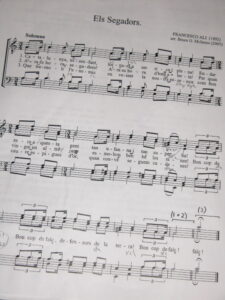 Bruce had intended all along for “Els Segadors” to be a surprise. With our program apparently finished, he spoke to the audience in English (which many appeared to understand), saying that in exchange for the generosity and hospitality shown to us by the Catalan people, we had a little “gift,” something from our heart to theirs. With that, he turned, and we started to sing “Els Segadors.”
Bruce had intended all along for “Els Segadors” to be a surprise. With our program apparently finished, he spoke to the audience in English (which many appeared to understand), saying that in exchange for the generosity and hospitality shown to us by the Catalan people, we had a little “gift,” something from our heart to theirs. With that, he turned, and we started to sing “Els Segadors.”
The effect was electric. We had sung no more than a note or two, when the audience, realizing what we were singing, emitted a collective gasp, then a brief cheer. Then absolutely everyone in the audience of 1200 or so, jumped to their feet, the lights went up, and they sang along with us. We joked afterward that it wouldn’t have been necessary to learn the words after all since no one could hear us after the first few were sung.
This song, which had been suppressed for many years, as late as the 1960s, had a greater effect than we could have imagined. There were many tears in the audience, and many of us on the stage struggled to keep our emotions under control so we could get to the end of the piece. It was a magical moment, which none of us will forget, a moment in which we connected to an audience in a profound way, and in the process probably changed the feelings of a lot of Barcelonans about Americans.
After the excitement died down, there were the same presentations and speeches as the previous night. And all the choruses assembled on the stage to sing “Jovenivola” under the direction of “Ellie.” The piece seemed to go better than the previous night, and we all felt a closer tie to the Catalonian people, their language, and their music.
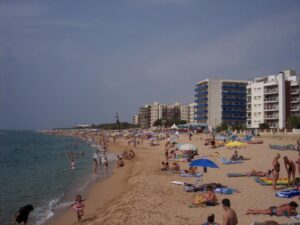 Of course, we rehearsed today from noon to 3, working on new music in preparation for our concerts on Wednesday, Thursday, and Friday. But the rest of the day was unscheduled, and most of our group took advantage of the opportunity. Nearby, there was, of course, the beach, with all sorts of water activities. There were bicycle rentals for riding along the beach and the town’s bike paths and narrow streets. There were boat excursions further up the coast. And of course, there was the intriguing city of Barcelona, just 60 km. away. Many of us spent this day sampling Barcelona’s architectural wonders, gastronomic adventures, and of course, the comforts offered at its many bars and nightclubs. This was the pattern throughout the week: most would fit in what sightseeing and recreation they could between rehearsals and concerts.
Of course, we rehearsed today from noon to 3, working on new music in preparation for our concerts on Wednesday, Thursday, and Friday. But the rest of the day was unscheduled, and most of our group took advantage of the opportunity. Nearby, there was, of course, the beach, with all sorts of water activities. There were bicycle rentals for riding along the beach and the town’s bike paths and narrow streets. There were boat excursions further up the coast. And of course, there was the intriguing city of Barcelona, just 60 km. away. Many of us spent this day sampling Barcelona’s architectural wonders, gastronomic adventures, and of course, the comforts offered at its many bars and nightclubs. This was the pattern throughout the week: most would fit in what sightseeing and recreation they could between rehearsals and concerts.
Our hosts had early on planned one full day of recreation for the visiting choruses, and this took the form of a bus trip to the mountain shrine of Montserrat, with a stop at the Cordoniu winery.
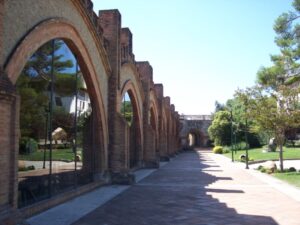 The winery came first and included a movie and mini-lectures by our guide to give us a sense of the long and impressive history of the Cordoniu name and the cava for which it had become famous. After a brief tour of the grounds, we entered the winery itself, where we observed the entire process of making wine, minus the crushing of the grapes. We saw the vats for the “first fermentation,” the initial bottling for the “second fermentation,” the seemingly endless ranks of bottles with fermenting wine “in repose” (which we viewed on a whirlwind ride in open cars), the removal of the wine from the fermenting bottles, and the final bottling process. Next, we were led to the tasting room, which nearly everyone in the group was most looking forward to. Finally, of course, we were directed out through the gift shop.
The winery came first and included a movie and mini-lectures by our guide to give us a sense of the long and impressive history of the Cordoniu name and the cava for which it had become famous. After a brief tour of the grounds, we entered the winery itself, where we observed the entire process of making wine, minus the crushing of the grapes. We saw the vats for the “first fermentation,” the initial bottling for the “second fermentation,” the seemingly endless ranks of bottles with fermenting wine “in repose” (which we viewed on a whirlwind ride in open cars), the removal of the wine from the fermenting bottles, and the final bottling process. Next, we were led to the tasting room, which nearly everyone in the group was most looking forward to. Finally, of course, we were directed out through the gift shop.
By the time we reached Montserrat, we were hungry enough that the bag lunch provided by our hotel looked good enough to eat. This we did while taking in the truly spectacular view of the mountains and surrounding Catalan countryside. (Only later did we find the nearby cafeteria, with much more appealing fare). Montserrat includes a monastery, a museum, a library, a choir school (with a well-known boys’ choir), a national park that can be explored via many trails, and a basilica that houses the Black Madonna, a statue of the Virgin Mary with a history dating back to 880 AD or perhaps 50 AD.
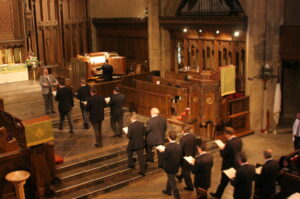 The basilica was our destination, and we had very little time to eat and explore before we were to assemble there. The idea was that all 3 choruses would have the opportunity to sing in that impressive space, with its excellent acoustics. We took our seats in the pews, from which we could see people paying their respects to the Black Virgin, in a silver-framed window some 30 feet above the altar.
The basilica was our destination, and we had very little time to eat and explore before we were to assemble there. The idea was that all 3 choruses would have the opportunity to sing in that impressive space, with its excellent acoustics. We took our seats in the pews, from which we could see people paying their respects to the Black Virgin, in a silver-framed window some 30 feet above the altar.
The Choral Society Saint Rafailo Banatsky went first, singing 3 pieces of their sacred repertoire that were perfect for this setting. Their director (Nino Rajaci?), then turned to the audience and invited the Mastersingers to join them in singing “Otche Nash” by Nicolai Kedrov. Interestingly, this setting of the Lord’s Prayer by this Russian composer was in the repertoires of both singing groups. We sang in a key that didn’t allow us to show off our low notes, but the effect was still stunning — another memorable cross-cultural experience of the many that marked this week.
Mastersingers USA (or Mastersingers “oo-sa,” as we were repeatedly introduced) kept our place on the steps below the altar to sing several selections: “Thy Word Is a Lantern,” the Biebl “Ave Maria,” and “Soon-Ah Will Be Done.” It’s safe to say that the 400-year-old walls of this historic church have never heard that latter spiritual, and one wonders, too, whether they ever even heard a ringing chord like the glorious one that ended that piece.
The Bonifantes choir sang an extended set of music after we finished, whereupon we all left the basilica and enjoyed the dramatic mountain scenery for the next half-hour as we made our way back to our busses and the trip back to Malgrat de Mar.
This day began for most of us with a rehearsal from 9:30 until noon. It was an opportunity to work on some of the new pieces we wanted to add to our concert repertoire. And indeed, several pieces rehearsed this morning together for the first time were performed this evening. After rehearsal, most of us scattered to make the most of the 6 hours of free time before we had to assemble for the bus trip to our concert venue.
The concert venue was a theater “complex” that included a bar, meeting rooms, and a quaint little theater that seated about 300 people. On our arrival, we went to the bar area where we had another of those bag lunches from the hotel (the less said about them, the better). Then we went to the theater for a brief warm-up and to experience the acoustics before starting our program.
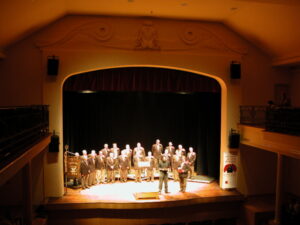 Immediately after this, we took seats in the audience, joining the roughly 150 people there, and the program began with 3 pieces performed by the local men's choir, Societat Coral L’Aliança. Perhaps we were a little surprised that this group of 25 or so senior citizens sang their Catalonian repertoire quite well.
Immediately after this, we took seats in the audience, joining the roughly 150 people there, and the program began with 3 pieces performed by the local men's choir, Societat Coral L’Aliança. Perhaps we were a little surprised that this group of 25 or so senior citizens sang their Catalonian repertoire quite well.
Our program began with the rousing “All That Hath Life and Breath,” and it seemed to galvanize the audience. Next was de Victoria’s (a 16th-century Spanish composer) “O Vos Omnes.” We nearly lost our director on this one. The performance of this piece, which spanned the singing career of many of us, including Bruce, was so transcendent, that Bruce seemed on the verge of losing control of his emotions. (And seeing his reaction, many of us were similarly moved.) We tried not to think too much about Bruce’s oft-used aphorism, “Show me a man without tears, and I’ll show you a man without a soul.” Somehow, we got through the piece.
Next, was Pablo Casal’s (a Barcelona native) setting of the same text, “O Vos Omnes,” followed by “Ave Maria” and “Salmo 150.” All this music was warmly received by the audience, and we had warm thoughts about how intelligent and refined they were. But not too refined to enjoy the rest of our program: Jamaica Farewell, Kalinka*, Kro Kro Hinh Hinh*, Switzer Boy, Roberta Lee, Ain’t Got Time to Die (this time with Zack Halop as soloist), This Train*, Sometimes I Feel Like a Motherless Child, Steal Away*, and Vive l’Amour. This was our first performance of the Casals “O Vos Omnes,” as well as the starred pieces. “Kro Kro Hinh Hinh” was particularly dicey because it is a solo chant with chorus response in the Twi language spoken in Ghana. As soloist, John Messenger performed valiantly, and Bruce tried to give all the complex cues to both soloist and chorus. Amazingly, it all came together perfectly, though it felt a bit like walking on the roof ledge of a ten-story building.
We ended the concert as we had done at the Palau on Sunday night. Bruce announced the “gift,” and we started “Els Segadors,” and the audience went crazy. The emotion both in the audience and on stage may not have been quite as intense as it was Sunday night, but it came close. Afterwards, there were free beers and cokes in the bar, with a lot of informal mixing with the host choir and the audience. Among the many enthusiastic comments we heard was the observation that they had seen many foreign singing groups perform at La Garriga, but that ours was the best by far. After about 20 or 30 minutes of this “afterglow,” we loaded onto our busses and returned to Malgrat de Mar.
This morning’s rehearsal from 9 to noon was to be our last. Bruce decided to scale back his plans for introducing more new music from our repertoire, with the result that 9 of the 34 pieces which we prepared for this week in Barcelona (and which many of us memorized) were not sung at all, even during rehearsal. This change in plans with the canceling of the Friday morning rehearsal allowed many of our group to plan more extensive sightseeing for Friday.
This last rehearsal corrected some problems encountered last night, and prepared us to sing a couple of new pieces, “Pueri Hebraeorum” and “Marry a Woman Uglier Than You.” As usual, everyone scattered after the rehearsal, until we had to reassemble for our bus to Sant Andreu at 7.
Sant Andreu is a major district on the eastern edge of Barcelona, but it is not in the tourist books. Rather, it is a working-class area with, however, an apparently active cultural life. The theater in which we were to sing was a fairly modern facility that seated about 350 in seating that rose at a very sharp angle from the level of the stage. The stage itself was more suited for dramatic than choral productions with a very high fly tower above the stage that was very effective in swallowing our sound. The two wide “risers” only rose about 2 inches each, so the whole set-up caused us considerable consternation. We eventually formed a horseshoe around Bruce as far downstage as we could get. Bruce asked for a podium of some sort, and we were told that the theater carpenter was making one for him, but it never materialized.
After our brief warm-up we took seats high in the theater, the lights went down, and our host mixed chorus, Societat Coral La Lira de St. Andreu, began to sing. It was very similar to previous performances: about 2 dozen singers, 3 songs, all in Catalan, and similar in style — but well done.
The shocking thing was the size of the audience. No doubt the hour had something to do with it (a 10 p.m. start on a Thursday night), but there were no more than a couple dozen audience members besides our wives. We tried to ignore the weak turnout and gave the performance our best shot. “Els Segadors” once again brought people to their feet.
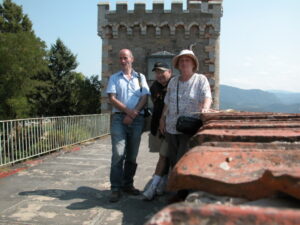 Mastersingers overseas tours always end with a banquet that gives ample opportunities for group fun and long good-byes. This week in the Barcelona area was quite different. A third or more of our group left the hotel in Malgrat de Mar during the day today, intending to spend the night at a hotel in Barcelona (to facilitate sightseeing both today and tomorrow). So this was a strange day. For those remaining in our hotel tonight, the day was devoted to indulging the pleasures of the Costa Brava, visiting sightseeing spots by boat or car, buying last-minute gifts, or just hanging around the hotel and talking. Others were engaged in packing, traveling to Barcelona, and taking in what sightseeing they could until concert time.
Mastersingers overseas tours always end with a banquet that gives ample opportunities for group fun and long good-byes. This week in the Barcelona area was quite different. A third or more of our group left the hotel in Malgrat de Mar during the day today, intending to spend the night at a hotel in Barcelona (to facilitate sightseeing both today and tomorrow). So this was a strange day. For those remaining in our hotel tonight, the day was devoted to indulging the pleasures of the Costa Brava, visiting sightseeing spots by boat or car, buying last-minute gifts, or just hanging around the hotel and talking. Others were engaged in packing, traveling to Barcelona, and taking in what sightseeing they could until concert time.
At about 7 p.m., those of us still at the Hotel Reymar were bussed to Castelldefels, a city of 40,000 on the Mediterranean, about 10 km. southwest of Barcelona. It seemed to us a vibrant city — at least what we saw of it. At its heart is the Plaça d’Església, the location of the Parochial Church, where our concert was to begin at 9:30. As we assembled outside the church, this large plaza was filled with activity: kids playing, people dining, families gathering, couples strolling — all enjoying the Friday evening as the temperature began to moderate. We entered the church, which seated about 350. Our audience was already there, about 275 people, who listened politely while we warmed up and started a few of our pieces to get the feel of the place.
We then took our seats in the side of the church, and listened to the host male chorus, Coral Marinada de Castelldefels, while it sang three Catalan pieces to the accompaniment of an accordion.
We began with five pieces from our sacred repertoire, which the audience seemed to appreciate a great deal. They really warmed to our folk song section and seemed impressed with the variety of languages, cultures, and styles represented in our repertoire. All the while, Bruce was interacting with the audience, especially those in the front rows, and his informality and humor, together with the spirit and intensity of our group, clearly made a favorable impression on our listeners. The setting was our most intimate, since the chorus was so close to the audience, and perhaps all these factors combined to produce what seemed like the most responsive audience of the week. And of course, their response to our “gift” of “Els Segadors” raised the good feelings that had been building to their emotional pinnacle.
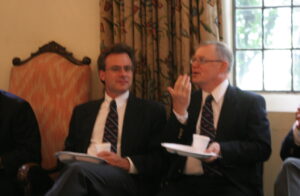 After the concert was over, we assembled in a hall adjacent to the church, where champagne, other drinks, and cookies were available. Many of our audience and the host choir joined us, as did our guides from the host organization, the Federació de Cors de Clavé, and of course, our wives. In this stiflingly hot but festive atmosphere, there were a few brief speeches, the singing of what has become one of our theme songs, “Ride the Chariot,” and a lot of hugs and heartfelt goodbyes. This scene lasted for 45 minutes or so until the busses arrived which would take some of us directly to the airport, and others back for one more night at the Hotel Reymar. The remainder of our group drifted off to cabs for the trip to their hotels in Barcelona. And with that, it was over.
After the concert was over, we assembled in a hall adjacent to the church, where champagne, other drinks, and cookies were available. Many of our audience and the host choir joined us, as did our guides from the host organization, the Federació de Cors de Clavé, and of course, our wives. In this stiflingly hot but festive atmosphere, there were a few brief speeches, the singing of what has become one of our theme songs, “Ride the Chariot,” and a lot of hugs and heartfelt goodbyes. This scene lasted for 45 minutes or so until the busses arrived which would take some of us directly to the airport, and others back for one more night at the Hotel Reymar. The remainder of our group drifted off to cabs for the trip to their hotels in Barcelona. And with that, it was over.
It was a grand experience -- the music, the fellowship, the sightseeing, and recreation all more than made up for the minor problems. It was a shared adventure which each of us will remember fondly.
And there was one more special thing that happened in Barcelona. Those of us privileged to be a part of it, thought of the first Mastersingers tour in 1996 as a once-in-a-lifetime experience. Then there was another once-in-a-lifetime experience with the 2000 tour. And then the brilliant triumph at the Eisteddfod in Llangollen in 2003, and the New York and Chicago reunions in 2002 and 2004. During this time our much-loved leader, Bruce McInnes, has been tentative, not sure he’ll be able to do it all again.
Now, fully retired and as vigorous as when he convened us in 1996, Bruce reminded us that we’re his only singing group, and he observed once again that “Mastersingers is the blood that flows in my veins.” But more than that, he indicated that he’s ready for more tours and annual reunions, and we all got a sense that we have progressed from an ad hoc collection of singers to an organization that will continue for a very long time. Bruce was the common denominator that brought us all together, but our ties with each other are now so strong, and the talent so deep, that we’re all ready for almost anything, ready to sacrifice and adjust our busy schedules to make time for this wonderful group of people and the extraordinary experiences it provides.
